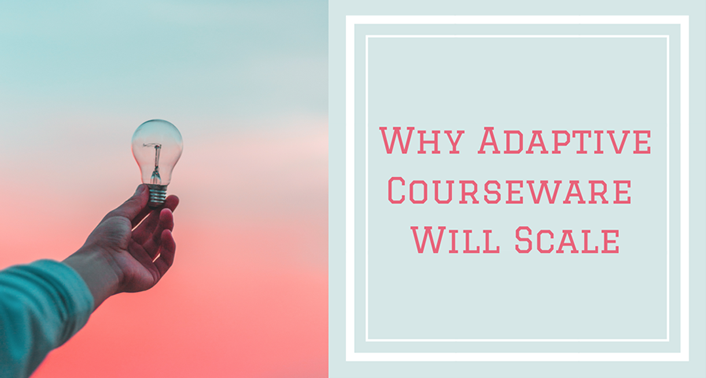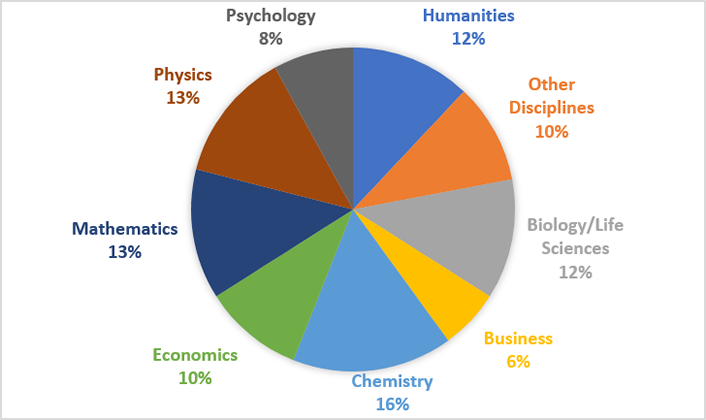
Universities are making huge technology and personnel investments in order to improve student success. Only a few of those efforts, however, invest in faculty development and support. Yet faculty are key to student success.
Currently, faculty members lack sufficient learning analytics about where students are struggling — especially early on in the semester. Adaptive courseware is a technology that can provide academics with valuable information regarding who needs help, and in wh at areas. It can also allow faculty to reshape valuable classroom time so that the focus is instead on active learning designed to help students clear misconceptions and build content comprehension.
The Association of Public and Land-grant Universities (APLU) grant program Accelerating Adoption of Adaptive Courseware at Public Research Universities includes eight participating institutions:
- Arizona State University
- Colorado State University
- Georgia State University
- Northern Arizona University
- Oregon State University
- Portland State University
- University of Louisville
- University of Mississippi
Adaptive Courseware Adoption Is Increasing Across Disciplines
In the first six months of the grant, the universities collectively reported over 22,000 enrollments. In that same six months, program managers increased the number of vendors from six to 12 which means that universities now have more choice among adaptive courseware tools As the chart below shows, the disciplines where courseware is being used are spread across most introductory general education courses.

Universities involved in the scaling grant will tell you this is hard work. Many of the adaptive courseware products are still being developed and improved. Faculty and departments want data about whether these products will work (or not). But those same faculty, departments, and program managers also agree current student success rates are simply not good enough. For students who are low-income, minority and first generation, the student success rates are even more problematic.
Each university has its own individual context that lays the groundwork for scaling adaptive courseware, but all of them recognize that without discipline and course faculty working together, reaching a broader scale is not possible. Each university program manager is identifying lead faculty but also working simultaneously with departments — and often entire colleges — thus securing bottom up and middle management alignment.
Faculty Insights + Technology Lead to Successful Changes, Intervention
Of course, that is only a first step. Then comes the challenging work of reviewing vendor courseware. There are some helpful tools like the CWiC Framework, which require vendors to address whether products meet certain standards like adaptivity. Faculty often need to scrutinize carefully the content, assessment, and outcomes to make sure those items align with published syllabi. In some cases, content and syllabi need to be redesigned to create a better course experience leveraging the adaptive courseware.
Faculty and program managers then turn their attention to the learning analytics. These vendor systems provide significant data on students, but for the most part, it is up to faculty to interpret and intervene. The real-time data enables faculty to reach out to individual students and change activities in the classroom.
Most of our universities indicate that by and large, faculty are coupling adaptive courseware with active classroom learning, and where possible using new active classrooms or at least redesigning the remaining classroom time to be active. Classroom time is now spent clarifying students'; understanding of the material versus just engaging in lecture. In fact, APLU was able to bring together about 100 faculty and staff this past summer at the University of Louisville to attend the Faculty Workshop on Active & Adaptive Learning. Our workshop facilitator, Dr. Scott Freeman, has published multiple research pieces on how active learning benefits students at risk. That meeting has led to six new online communities of practice sharing effective practices and failures to avoid when launching and scaling adaptive courseware in your discipline.
The APLU grant has spurred an interest in adaptive courseware. Combined with faculty desire to improve teaching, and universities desire to increase student success, these tools will lay the foundation for scaling.
Karen Vignare is Executive Director of the Personalized Learning Consortium for the Association of Public and Land-grant Universities.
